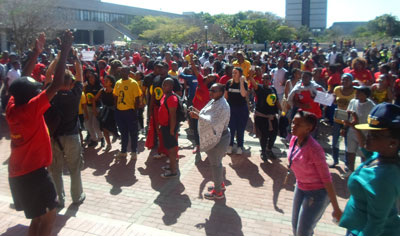
After weeks of protests and putting pressure on university management, students from poor families and workers at the Nelson Mandela Metropolitan University were victorious. The university council released a statement saying that they have resolved to commit the university to ending outsourcing of service workers. The council also pledged debt relief for students.
The mass action at Nelson Mandela Metropolitan University in Port Elizabeth started as a peaceful gathering of students who blocked entrances to both the North and South campuses that cascaded to a full-blown protest after police were called in to quell the agitating students.
Student Representative Council president, Hlomela Bucwa, 22, blamed the police for subsequent violence.
“We held fruitful discussions concerning fee increase with university officials. In fact we were waiting for them to come back to us. As for the violence, the police provoked the students,” she explained.
According to Bucwa the protest was “meant to be peaceful and well organised. But the police started to fire stun grenades, rubber bullets and teargas at us. That changed the tone of the protest and students were now calling for zero increase.”
Sasco chairman, Yandisa Ndzoyiya was more militant and adamant that education should be free.
Ndzoyiya reiterated that NMMU was using undemocratic means when fees were being decided.
High among student grievances was the controversial Minimum Initial Payment(MIP). A deposit every student is required to pay upfront with registration.
Khanyi (surname withheld) a nursing student from Butterworth said the money was too much as her parents were unemployed.
“My parents struggled to pay the MIP. They had to sell one of our cows to raise the money. After paying this then one can apply for NSFAS but the program cost R27,000 a year” she said.
A fourth year law student who refused to be named said “instead of becoming happy when you graduate the government starts docking your salary the first month of your employment. The interest is very high and at present its nearly R100,000 that I owe the institution. It is too much.”
Mziwamadoda Mhlanga, a parent whose son dropped out in his second year of a civil engineering degree after he was retrenched, appealed for free education. “I am always at the local clinic because of high blood pressure. I feel I have failed my son because he is now doing menial jobs”, he said.
First-year BA student Micaela Williams, said she was lucky to have a private sponsorship. She said “bursaries should also be extended to colored people. Few receive them.”
Unnecessary violence was used to quell the protest. Students and stakeholders claim that police tactics were heavy handed and that they will pursue legal action against the police.
Police spokesperson, Captain Johan Rheeder, rubbished claims of excessive use of force and argued that what happened was within the confines of law. He also said while students had the right to protest, ordinary citizens also had the right of movement.
Cpt Rheeder explained, “It is illegal for students to block public roads. The students threw stones at the police who then fired teargas at them.”
The statement released by the council chairperson Judge Ronnie Pillay stated that the council had instructed management to put into place the following immediate relief measures:
- Across the board minimum wage guaranteed to each service worker of R5,000 per month cost to company.
- The new minimum wage level will come into effect on 1 December 2015 until service workers in key sectors are insourced.
- During the university shut-down period, such workers will continue to receive the same level of pay and benefits.
- Study benefits currently available to NMMU permanent staff will be available to all service workers employed in outsourced companies;
- Staff currently employed in outsourced services will have access to university clinic services for medical treatment.
The council would also look at debt relief for students. These included:
- debt relief for all NSFAS students with zero-EFC (expected family contributions);
- debt relief for all NSFAS-eligible students with outstanding balances;
- debt relief for students falling in the ‘missing middle’ income brackets who are academically deserving;
- removal of the requirement for upfront payment for students falling in the ‘missing middle’ income bracket; and
- to lift the threshold of qualification for financial assistance.




 en
en